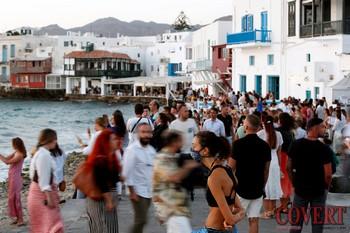
Is it time for Greece to change its tourism model?
Newswire
Athens: As temperatures soar and tourist arrivals swell, Greece is under pressure to reimagine a tourism model that climate change is making increasingly untenable.
With its turquoise waters and reliable sunshine, Greece has long been a popular holiday destination, attracting nearly 33 million visitors last year and generating 28.5 billion euros in revenue ($31.7 billion).
This year’s total visitor numbers are expected to rise further, as global tourism sets new records from pre-pandemic levels, but the surge in holidaymakers could undermine the economic mainstay in the near future.

Anger over ‘overtourism’ has even sparked protests in recent years on the beaches of the Cyclades, a collection of Aegean islands.“People in Greece are getting more concerned that the (Cycladic islands) are changing very rapidly and, in a few years, what is special is going to be lost,” said Dimitris Vayanos, an economist at the London School of Economics.
Greece is not alone. Residents in other popular European destinations say visitors are harming the environment and local economies, particularly as short-term rentals from home-stay websites like Airbnb drive up housing costs and price people out of their towns and cities.
But Greece is among Europe’s hardest-hit countries by global warming, and rising sea levels, scorching heatwaves, erratic rainfall and frequent wildfires are changing the landscape.
Tourism is placing an extra burden on scarce water resources and threatening fragile coastal environments, leading to calls from local authorities and the national ombudsman to regulate construction, restrict tourist flows and invest in water management and infrastructure.
The government has to balance mitigating these threats against protecting critical tourism earnings. Tourism contributes between 62.8 billion euros and 75.6 billion euros to the Greek economy, roughly a third of gross domestic product annually, according to the Hellenic Tourism Business Association (INSETE).
A law in July updated regulations for tourism agencies, guides and rentals that Tourism Minister Olga Kefalogianni has said will make the country a “global tourism power,” part of “critically important” efforts to safeguard the industry and benefit the economy.
But climate change poses existential questions for the industry.
A lengthy heatwave in June, followed by the hottest July on record, forced tourist attractions to close and caused a spate of heat-related deaths.
Wildfires, made more intense and frequent by hotter, drier weather linked to climate change, also threaten the tourism industry. A massive blaze earlier this month came within miles of the capital Athens.
Last year, more than 8,000 forest fires raged across the country, and thousands of tourists had to be evacuated from islands, including Rhodes.
“What we want to see is that tourism is sustainable or even regenerative. It has to invest in conservation of the ecosystem, and it has to assist with the cost of managing the tourists on the ground,” said Megan Epler Wood, director of the Sustainable Tourism Asset Management Program (STAMP) at Cornell University in the United States.
The ombudsman, a Greek official who investigates public complaints, said in a June report the country needs to reduce construction and protect water resources and coastal areas to maintain healthy tourism.
It warned of the growing environmental risks from tourism, particularly the additional demands on water supplies for drinking, swimming pools and water parks.
A pilot study, carried out by Greek researchers and Unesco, the UN cultural agency, found that smaller islands in the Aegean Sea already need double the amount of water they can naturally produce to meet demand from tourists, which is set to increase twofold by 2030.
“The more these islands are developed, the less attractive they will be to visitors,” said Vayanos.Greece should tailor tourism to make it more compatible with environmental standards, including the use of zoning, and concentrate development in specific areas, he said.
The introduction this year of a tourist tax, dubbed the climate resilience fee, is meant to help finance recovery from worsening forest fires and floods.The fee for guests staying in hotels and short-term rentals is expected to generate up to 300 million euros in additional revenue in 2024.
But Epler Wood said that historically, tourist taxes have gone towards destination marketing rather than benefitting local communities. Research by STAMP found water, waste, energy utilities and affordable housing often did not gain at all.
The Central Union of Greek Municipalities (KEDE) is calling for the revenue from the tax go to local government to help them manage tourists.There is also little evidence that tourism taxes reduce arrivals, according to a report by strategy company Group NAO.Nikos Zorzos, the mayor of Santorini, wants to cap the number of daily cruise-ship visitors at 8,000 from as many as 17,000 people.
